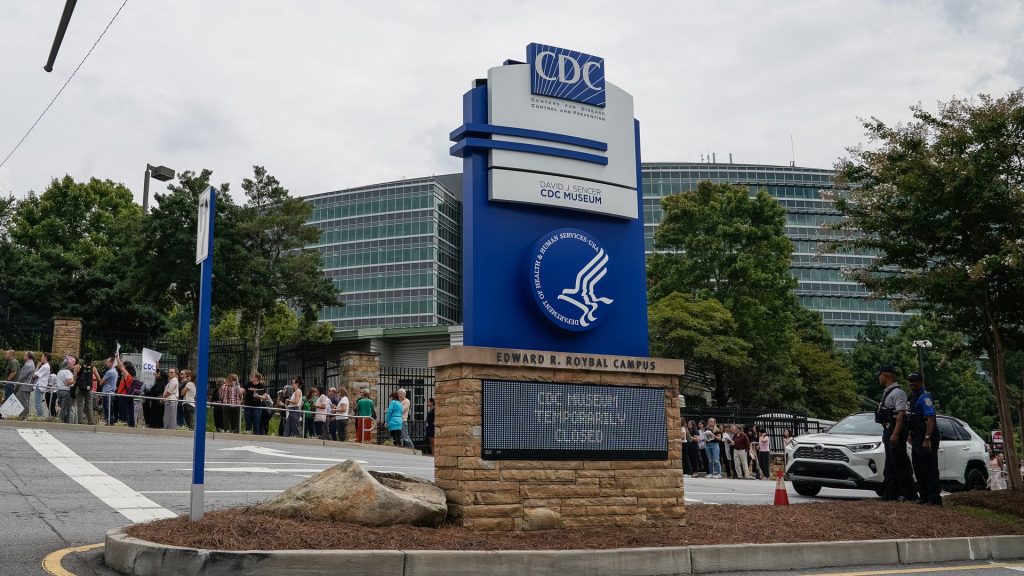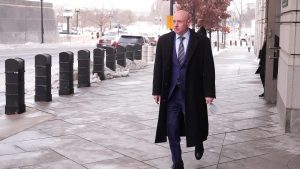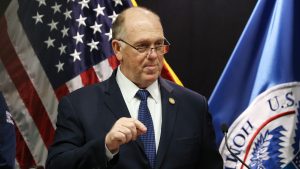Former CDC employees say turmoil is impacting the agency’s mission

Another round of firing and rehiring at the Centers for Disease Control and Prevention is the latest moment in a tumultuous year for the agency. Former employees told Straight Arrow News there are several ways this turbulence will impact the agency’s work.
CDC’s latest changes
Hundreds of agency employees found out they will get to keep their jobs after being laid off Friday, Oct. 10.
Among those employees who “were sent incorrect notifications,” include two top leaders of the federal measles response team, people working on containing the Ebola virus in the Congo and the team behind the CDC’s scientific journal, “The Morbidity and Mortality Weekly Report.”
This incident comes amid a government shutdown the GOP continues to blame on Democrats, despite holding majorities in the House and Senate and controlling the White House. There’s a banner currently on the homepage of the CDC blaming Democrats that some believe violates several laws.

It’s the latest episode of turbulence at the agency since the Trump administration came into power in January.
“With each trauma that was inflicted upon the staff, it has been difficult for them to do their work,” Dr. Deb Houry, former chief medical officer of the CDC who famously resigned in August, told SAN.
Houry also testified in front of a Senate committee that she resigned because of actions by Kennedy.

Last month, more than 1,000 federal health employees called on Health and Human Services Sec. Robert F. Kennedy, Jr. to resign.
In August, there were conflicting reports over the firing of CDC Director Susan Monarez, and a shooting left two people dead at the Atlanta headquarters.
There’s been substantial turnover on the CDC’s vaccine advisory panel after Kennedy fired the entire panel earlier in the year.
Then there was the first round of major layoffs where approximately 10,000 employees lost their jobs. Similar to the recent situation, some of those employees got their jobs back immediately after the agency said they were fired by mistake.
“I was there for the layoffs in April, and we thought there would be 30 days before people went on administrative leave and people were placed on administrative leave that day,” Houry said. “And that makes it very difficult to transition projects, to even sunset or put acting people in place. [A] similar thing, to my understanding, happened this weekend.”
She said layoffs weren’t unexpected.
“When I was the transition lead for the agency, we did look at ways we could be more efficient, and we did expect job cuts,” Houry said. “But that’s a scalpel versus a machete.”
Layoff impact
“One of the things we accidentally canceled, very briefly, was Ebola prevention,” former DOGE leader Elon Musk said with a chuckle to Trump’s cabinet at the time. “I think we all want Ebola prevention. So, we restored the Ebola prevention immediately.”
The latest hiring and rehiring are almost identical to what we saw when Musk’s team was in charge.
“It just suggests that there’s not any thinking going on,” Dr. Anne Schuchat, retired deputy director for the CDC, told SAN. “The error prone firings of April are being repeated, and so they’re really not learning from their mistakes.”
The former employees we spoke with all said losing employees will have an impact on ongoing projects and research being done by the agency.
“It affects all aspects of the work,” Dr. Larry Anderson, a pediatric infectious disease doctor who worked at the CDC for 33 years, told SAN. “I think there’s turnover of staff, there’s decreased morale, there’s disruptions of one thing and then another thing. That has enormous impacts on the quality. If you don’t have the people and the right people to do things, the quality is not going to be as good.”
For those still working at the agency, Schuchat said things can get tough during mass layoffs.
“You can imagine how confusing this is for people who are still at the agency, and for the partners and programs that were funded or collaborated with the agency,” Schuchat said. “The suddenness of the reductions in force, lack of transition plans, the firing of the leadership levels mean that there’s really not a coordinated approach to protect the work. So, if the aim was disruption and demoralization, they have been very successful.”
Connections to other agencies was something each of the former employees brought up.
“People knowing and having relationships with other important collaborators, the state health department, NIH, FDA, and a variety of other organizations, has been an important part of much of what CDC has done,” Anderson said. “And I think that interaction has benefited health in the U.S. as well as globally.”
Short term impacts
Take the FDA as an example. Food recalls may come from the FDA, but don’t necessarily begin there.
“They’re often initiated because people have gotten sick and trace backs and outbreak investigations have identified a common source,” Schuchat said. “And so that kind of system requires a network of people and laboratories and rapid response actions that are probably in a chaotic state right now.”
Other short term concerns were over vaccinations.
“About half of the vaccines that children get come through purchases by the Centers for Disease Control and Prevention Through the Vaccines for Children program,” Schuchat said.
Kennedy’s outlook on vaccines in general was a concern among the employees.
Another concern, in both the short term and long term, is U.S. preparedness for another pandemic or major health event.
“CDC won’t be ready to respond,” Houry said. “And I think what is troubling about some of the current layoffs that are still underway is CDC can’t do its work. When the entire HR office is laid off, they can’t bring people on. They can’t bring people off. The whole conflict of interest office is laid off, so they can’t look at CDC senior leaders and what other conflicts of interest or ethics.”
Long term impacts
“It’s what we are able to do tomorrow, and how we can respond to future health events like COVID-19, the opioid outbreak, the tools and the people to respond to that,” Anderson said. “I don’t know that we have those so we’re more vulnerable.”
When asked about long-term concerns, each former employee SAN spoke with shared concerns about data collection, something they said is critical when it comes to public health.
Schuchat said changes were being made at the agency to modernize how public health data is collected, accessed, shared and more.
“The improvement efforts have not only been interrupted, things are going backwards,” Schuchat said. “The loss of institutional knowledge, the interruption of contracts that were just stopped without any handoffs, it means it’s going to take a long time to recover, rebuild and potentially improve.”
“With the loss of people in some of these budget cuts means that the data is not going to be as timely and as open to the public as it had been,” Houry added.
Between the three people we spoke with, they shared more than 75 years of experience at the agency, which they said has a certain culture that can be lost with mass firings.
“You’re losing people that have been important in passing down culture, standards and perspectives, “Anderson said. “When you lose these people, you lose some of that input and context from which people work in the future.”
Getting people to work there in the future is also of concern.
“I really hope that young people aren’t losing interest in public service or public health, and that we’ll have people to take these jobs in the future when things stabilize again,” Schuchat said.
Global impact
Along with concerns of losing the culture of the CDC, losing trust was another major concern of those we spoke with.
“I think we’re starting to see an erosion of trust with a lot of the work that’s happened under the secretary, where he fired the vaccine committee members and put people in that didn’t have the same experience,” Houry said.
Schuchat added that the American people will have a tougher time trusting information coming from the agency.
“If you want to get that latest information, you really can’t trust that it’s there on the website, because the connections aren’t being made,” Schuchat said. “If you’re trying to track disease occurrence, or you’re tracking mortality data, all of these things are being affected by the people in the programs that they’re cutting.”
They said the same is true on a global scale where America has a reputation as being one of the global leaders in health.
“It’s been damaged substantially,” Anderson said.
But they said it’s not just trust, it’s tangible elements of the global health community.
“The CDC is getting less of global virus samples for things like COVID and flu and polio,” Houry said. “That means that they won’t be prepared to protect us around the country with different variants or strains.”
Other data has shown qualified scientists and researchers are now looking at leaving the U.S. to continue their work elsewhere.
“It’s not even just perception,” Schuchat said. “We’re losing scientists to other countries.”
What can be done?
“Congress really needs to look at who’s being put on these advisory committees, as well as what is happening with these budget cuts,” Houry said. “With what happened with the firings over this past weekend, there should be oversight into what happened and where these mistakes were made. The agency can’t function when things like this are happening.”
Schuchat pointed to actions like California, Oregon and Washington, who formed their own alliance to coordinate public health policy away from the CDC.
“The trust building can be done at local levels through the doctors, nurses, other healthcare providers, pharmacists and so forth to try to fill gaps,” Schuchat said. “There are organizations, universities and journalists and others, that are trying to preserve the data that is at risk to be lost.”
And when it comes to the impact of health in the U.S., it doesn’t just stop at health.
“It’s been an economic driver for our country,” Anderson said. “The impact of what’s going on is just potentially enormous.”
The post Former CDC employees say turmoil is impacting the agency’s mission appeared first on Straight Arrow News.





